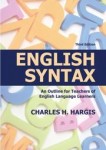ENGLISH SYNTAX I ...

...některými milovaná, jinými zatracovaná :-).. aneb je tenhle blog ještě moje osobní záležitost? Odpověď je ano, protože z anglické syntax skládám ve čtvrtek zkoušku, kterou vidím, jak by napsala Eithné, jako titul a moje letní relaxační plány ohrožující ;-), což považuji za velmi, VELMI osobní. Přece si nezkazím léto :-).
Chápu, že se těžko najde někdo, koho by moje školní poznámky bavily. Ale když mně to přepisování poznámek na blog, doplňování a upřesňování nejasného fakt moc pomáhá, tak, prosím, mějte se mnou v průběhu dalších článků trpělivost :-).
INTRODUCTION úvod , s tím by neměl být problém :-)
CLAUSE TYPES (PATTERNS)
SV ( subject - verb; podmět - sloveso) The sun is shining.
SVO (subject - verb - object; podmět - sloveso - předmět) The lecture bored me.
SVC (subject - verb - complement; podmět - sloveso - doplněk) I am tired.
SVA (subject - verb - adverbial; podmět - sloveso - příslovečné určení místa, času, způsobu) She is away.
SVOO (subject - verb - object - object; podmět - sloveso - předmět - předmět) She gave the book to me.
SVOC (subject - verb - object - complement; podmět - sloveso - předmět a doplněk) I find her opinions interesting.
SVOA (subject - verb - object - adverbial; podmět - sloveso - předmět - přísudek) She put the book on the desk.
VERB CLASSES
Intransitive /nepřechodná/ are followed by no obligatory element and occur in type SV (subject - verb).
- SHE SLEEPS.
Copular /sponová/ are followed by subject complement or an adverbial and occur in types SVC (subject - verb - complement) or in SVA (subject - verb - adverbial). (SEEM, BE, BECOME)
- HE BECAME A DOCTOR
Transitive /přechodná/ are followed by object and occur in types SVO, SVOO, SVOC, SVOA:
Monotransitive in SVO
Ditransitive in SVOO
Complex- transitive in SVOC, SVOA
SENTENCE TYPES AND THEIR DISCOURSE FUNCTIONS
oznamovací - declarative
tázací - interrogative
rozkazovací - imperative
přací . optative
zvolací - exclamative
Discourse functions:
statement
question
directive
wish
exclamation
Types of questions
YES/ NO positive - Do you live here?
YES/ NO negative - Has nobody called?
WH (who, what, where.. questions) Where are you from?
Declarative questions - You know what the risks are?
Alternative questions - Do you want beer or wine?
Tag questions - You know him, don´t you?
Types of directives
Without subject :positive: Come here!; Do open the door! negative: Don´t speak!
With subject: Somebody open the door!
With LET: Let´s go out!
Structural classes of clauses
wikipedia.org/wiki/Clause">clause that can stand by itself, also known as a simple sentence. An independent clause contains a subject and a predicate; it makes sense by itself.
Multiple independent clauses can be joined by using a semicolon or a comma plus a coordinating conjunction (for, and, nor, but, or, yet, so).
- I love penguins. (simple sentence)
- I drive a bus. (simple sentence)
- I am a doctor, and my wife is a lawyer. (compound sentence made up of two independent clauses: I am a doctor and my wife is a lawyer)
- I want to be a nurse, but I need to receive my science degree. (compound sentence made up of two independent clauses. (zdroj Wikipedia)
A dependent clause (also subordinate clause) is a clause used in conjunction with the independent clause, augmenting or attributing it. Dependent clauses cannot stand alone as a sentence; instead, they always modify the independent clause of a sentence. Although a dependent clause contains a subject and a predicate, it sounds incomplete when standing alone. Some grammarians use the term subordinate clause as a synonym for dependent clause, but in the majority of grammars, subordinate clause refers only to adverbial dependent clauses.
Finite, nonfinite, verbless
Subordinate clauses may be finite or nonfinite.
A finite clause has a finite verb. A finite verb has tense.
E.g.: "I run daily."
A non-finite clause has a verb without tense.
E.g.: "...to run daily..."
Non-finite clauses:
Infinitive: He forced them to sell the house.
Participles/gerunds: Whether trained or not, he is doing a perfect job.
Verbless:
Non-verbal clauses are:
-
nominative clauses.
The governing node of a nominative clause is a noun in the nominative (and other forms with the same function; see further).
For example:
Praha.
-
vocative clauses.
The governing node of a vocative clause is a noun in the vocative.
For example:
Milá Pavlíno! (=Dear Pavlina!)
-
interjectional clauses.
The governing node of an interjectional clause is an interjection or a yes-no particle.
For example:
Ach. (=Oh)
Ano. (=Yes)
SIMPLE, COMPLEX, COMPOUND, MULTIPLE SENTENCES
Simple - věta jednoduchá
Multiple sentences:
Complex - souvětí podřadné
Compound - souvětí souřadné:two or more main , independent clauses:
- copulative (slučovací O + O) (and, and..so, neither ... nor, both ... and)
- adversative (odporovací OxO) but, but on the contrary, however
- disjunctive (vylučovací O v O) or, or else, either ... or, otherwise
- causative (příčinné) O>O for
Nominal content clauses
- declarative THAT clauses závislé věty oznamovací:
- subject obsahová věta podmětná
- object obsahová věta předmětná
- subject complement obsahová věta přívlastková
- závislé věty rozkazovací - imperative
- závislé věty zvolací - exclamative
- závislé věty přací - optative
- závislé věty tázací - interrogative
Komentáře
| RE: ENGLISH SYNTAX I ... | maydayberry®svetu.cz | 06. 02. 2011 - 10:26 |
| RE: ENGLISH SYNTAX I ... | eithne | 06. 02. 2011 - 11:30 |
| RE: ENGLISH SYNTAX I ... | hp | 06. 02. 2011 - 12:02 |
| eithne | 06. 02. 2011 - 12:28 | |
| hp | 06. 02. 2011 - 13:42 | |
| eithne | 06. 02. 2011 - 14:02 | |
| eithne | 07. 02. 2011 - 09:29 | |
| hp | 07. 02. 2011 - 19:24 |